Si partiu di Nazzarettu

Si partiu di Nazzarettu,
(continuer)
(continuer)
envoyé par Riccardo Gullotta 16/6/2025 - 14:37
Parcours:
L'Holocauste palestinien
Canto dei confinati di Ustica 1927
anonyme

[1927]
Testo: Il Deposito - Canti di Lotta
Musica: Canto dei malfattori
Nel disco “Canti dei Lager” di Sergio Liberovici si trova una registrazione eseguita da Silverio Pisu nel 1966. Nel testo compare un’ altra canzone nota come “Al libro, all’aratro ed al martello” pubblicata da Catanuto e Schirone nel volume “Il canto anarchico in Italia la cui melodia è ripresa da una canzonetta del 1920 cantata dal tenore Cav. Elpidio Gaiotto dal titolo “Mamma non l’amo più”.
Il canto dei confinati di Ustica 1927 eseguito dal Coro Ingrato si rifà all’aria del “Canto dei malfattori” in quanto nel materiale cartaceo sequestrato in quel tempo all’anarchico Boldrini e poi finito nell’archvio Centrale di Stato, l’autore aveva chiaramente indicato che la melodia che accompagnava il testo era proprio il Canto dei Malfattori. Antonio Gramsci fu esiliato a Ustica nel 1926 ma vi rimase solo per 44 giorni. Copia di quel documento è conservato nell’archivio della FAI a Milano, viale Monza. - commento video YouTube
Testo: Il Deposito - Canti di Lotta
Musica: Canto dei malfattori
Nel disco “Canti dei Lager” di Sergio Liberovici si trova una registrazione eseguita da Silverio Pisu nel 1966. Nel testo compare un’ altra canzone nota come “Al libro, all’aratro ed al martello” pubblicata da Catanuto e Schirone nel volume “Il canto anarchico in Italia la cui melodia è ripresa da una canzonetta del 1920 cantata dal tenore Cav. Elpidio Gaiotto dal titolo “Mamma non l’amo più”.
Il canto dei confinati di Ustica 1927 eseguito dal Coro Ingrato si rifà all’aria del “Canto dei malfattori” in quanto nel materiale cartaceo sequestrato in quel tempo all’anarchico Boldrini e poi finito nell’archvio Centrale di Stato, l’autore aveva chiaramente indicato che la melodia che accompagnava il testo era proprio il Canto dei Malfattori. Antonio Gramsci fu esiliato a Ustica nel 1926 ma vi rimase solo per 44 giorni. Copia di quel documento è conservato nell’archivio della FAI a Milano, viale Monza. - commento video YouTube
Dagli affetti e dal lavoro ci han banditi i prepotenti,
(continuer)
(continuer)
envoyé par L'Anonimo Toscano del XXI Secolo 10/6/2025 - 09:35
I Got Shoes
anonyme
I Got Shoes
For obvious reasons, direct expressions of protest during slavery were dangerous. Yet, it is very clear that some of the songs created by enslaved people served as expressions of protest. Creators of the songs went to considerable lengths to disguise the true meaning of the lyrics. For those within the enslaved community, however, the meanings were very clear. The best example of a protest spiritual is the song commonly called "I Got Shoes," but also known as "Heav'n, Heav'n."
GOSPEL SONGS > I Got Shoes - #509
"All God’s Children Got Shoes" is based on an African American spiritual of the same name, sometimes written as “All God’s Chillun Got Shoes” or simply “I Got Shoes.” The song can, in part, be read as a form of protest. The lyrics describe various things that the enslaved individuals may not have had, such as shoes, that they would get once they got to Heaven:
... (continuer)
For obvious reasons, direct expressions of protest during slavery were dangerous. Yet, it is very clear that some of the songs created by enslaved people served as expressions of protest. Creators of the songs went to considerable lengths to disguise the true meaning of the lyrics. For those within the enslaved community, however, the meanings were very clear. The best example of a protest spiritual is the song commonly called "I Got Shoes," but also known as "Heav'n, Heav'n."
GOSPEL SONGS > I Got Shoes - #509
"All God’s Children Got Shoes" is based on an African American spiritual of the same name, sometimes written as “All God’s Chillun Got Shoes” or simply “I Got Shoes.” The song can, in part, be read as a form of protest. The lyrics describe various things that the enslaved individuals may not have had, such as shoes, that they would get once they got to Heaven:
... (continuer)
I've got a robe, you've got a robe,
(continuer)
(continuer)
envoyé par Pluck 18/5/2025 - 16:58
Goin' Down the Road Feelin' Bad
anonyme
Propongo come testo base di numerose altre versioni quanto ha pubblicato John A.Lomax nel 1947 come segnalato da The Mudcat Cafe’.
(Pluck)
THE MUDCAT CAFE'
Subject: Lyr Add: GOIN' DOWN THE ROAD FEELIN' BAD (Lomax)
From: BrooklynJay
Date: 15 Oct 10 - 03:09 PM
The song turns up on page 242 of the 1947 book Folk Song U.S.A. by John A. Lomax and Alan Lomax, edited by son Alan.
"Going Down The Road Feeling Bad" (also known as the "Lonesome Road Blues") is a traditional American folk song, "a white blues of universal appeal and uncertain origin".
The song was recorded by many artists through the years. The first known recording is from 1923 by Henry Whitter, an Appalachian singer, as "Lonesome Road Blues". The earliest versions of the lyrics are from the perspective of an inmate in prison with the refrain, "I'm down in that jail on my knees" and a reference to eating "corn bread and... (continuer)
(Pluck)
THE MUDCAT CAFE'
Subject: Lyr Add: GOIN' DOWN THE ROAD FEELIN' BAD (Lomax)
From: BrooklynJay
Date: 15 Oct 10 - 03:09 PM
The song turns up on page 242 of the 1947 book Folk Song U.S.A. by John A. Lomax and Alan Lomax, edited by son Alan.
"Going Down The Road Feeling Bad" (also known as the "Lonesome Road Blues") is a traditional American folk song, "a white blues of universal appeal and uncertain origin".
The song was recorded by many artists through the years. The first known recording is from 1923 by Henry Whitter, an Appalachian singer, as "Lonesome Road Blues". The earliest versions of the lyrics are from the perspective of an inmate in prison with the refrain, "I'm down in that jail on my knees" and a reference to eating "corn bread and... (continuer)
I'm goin' down this road feelin' bad,
(continuer)
(continuer)
envoyé par Pluck 14/5/2025 - 10:41
Canzone dei partigiani della Brigata Bruno Fanciullacci
anonyme
1944
In occasione di questo 75° Anniversario della Liberazione, non potendo festeggiare per strada come al solito, abbiamo pensato di omaggiare i tre partigiani che sono stati fra i primi componenti del nostro gruppo di Maggiaioli (attività proibita durante la dittatura fascista), condividendo e diffondendo una delle canzoni che cantavano i partigiani della Brigata Bruno Fanciullacci su Monte Morello e che ci è stata insegnata da Fernando Aiazzi (Barberino di M.llo, 1926, nome di battaglia "Baldoria”), Edo Malvini (Barberino di M.llo, 1924-1992) e Edo Mongatti (Barberino di M.llo, 1926-2010), conosciuti nei Maggiaioli come "Bordino" (Fernando) e "Criniera Bianca" (Edo Mongatti).
I Maggiaioli di Barberino di Mugello
In occasione di questo 75° Anniversario della Liberazione, non potendo festeggiare per strada come al solito, abbiamo pensato di omaggiare i tre partigiani che sono stati fra i primi componenti del nostro gruppo di Maggiaioli (attività proibita durante la dittatura fascista), condividendo e diffondendo una delle canzoni che cantavano i partigiani della Brigata Bruno Fanciullacci su Monte Morello e che ci è stata insegnata da Fernando Aiazzi (Barberino di M.llo, 1926, nome di battaglia "Baldoria”), Edo Malvini (Barberino di M.llo, 1924-1992) e Edo Mongatti (Barberino di M.llo, 1926-2010), conosciuti nei Maggiaioli come "Bordino" (Fernando) e "Criniera Bianca" (Edo Mongatti).
I Maggiaioli di Barberino di Mugello
Addio mammina, addio, cantava il partigiano nell’andar (continuer)
envoyé par Dq82 28/4/2025 - 16:54

L’HISTOIRE DE BELLA CIAO
Une interview de deux administrateurs des CCG – Chansons contre la guerre – avec Cesare Bermani et Carlo Pestelli sur l’histoire de Bella Ciao
Une interview de deux administrateurs des CCG – Chansons contre la guerre – avec Cesare Bermani et Carlo Pestelli sur l’histoire de Bella Ciao
Lorenzo Masetti 16/4/2025 - 22:19
Es ist vollbracht! [Operators in Gaza]
![Es ist vollbracht! [Operators in Gaza]](img/upl/its-my-life-paul-lovering.jpg)
[1724 / 2025]
Text / كلمات / Testo / מילים :
anonimo
Musik / موسيقى / Musica / לַחַן :
Johann Sebastian Bach
Johannes-Passion, BWV 245
Interpretiert von / مُؤَدِي / Interpreti / מבוצע על ידי:
Orchestra: Collegium Vocale Gent
Conductor: Philippe Herreweghe
I fatti
Domenica 23 Marzo l’esercito israeliano ordina l’evacuazione del quartiere di sfollati di Tal as-Sultan a Rafah. Per l’IDF in tale area si nasconde il centro di comando e di controllo di Hamas. Iniziano i bombardamenti. La Mezzaluna Rossa, avvisata da un osservatore locale di incidenti a al-Hashashin, invia due ambulanze del servizio UK-Med, situato nel centro di Al-Mawasi, distretto di Khan Younis.
Partono alle 04:15 della notte. A bordo di una di esse si trovano il conducente Mustafa Khafaga, il medico Ezz El-Din Shaat e Munther Abed, unico sopravvissuto alla mattanza appena iniziata. Sono colpiti dalla fanteria... (continuer)
Text / كلمات / Testo / מילים :
anonimo
Musik / موسيقى / Musica / לַחַן :
Johann Sebastian Bach
Johannes-Passion, BWV 245
Interpretiert von / مُؤَدِي / Interpreti / מבוצע על ידי:
Orchestra: Collegium Vocale Gent
Conductor: Philippe Herreweghe
I fatti
Domenica 23 Marzo l’esercito israeliano ordina l’evacuazione del quartiere di sfollati di Tal as-Sultan a Rafah. Per l’IDF in tale area si nasconde il centro di comando e di controllo di Hamas. Iniziano i bombardamenti. La Mezzaluna Rossa, avvisata da un osservatore locale di incidenti a al-Hashashin, invia due ambulanze del servizio UK-Med, situato nel centro di Al-Mawasi, distretto di Khan Younis.
Partono alle 04:15 della notte. A bordo di una di esse si trovano il conducente Mustafa Khafaga, il medico Ezz El-Din Shaat e Munther Abed, unico sopravvissuto alla mattanza appena iniziata. Sono colpiti dalla fanteria... (continuer)
Es ist vollbracht!
(continuer)
(continuer)
envoyé par Riccardo Gullotta 7/4/2025 - 18:08
Parcours:
L'Holocauste palestinien
The Hanging Tree (Palestine)
anonyme

Rifacimento pro-Palestina della canzone The Hanging Tree scritta da James Newton Howard e cantata da Jennifer Lawrence.
La trovo cantata da Lotta su Instagram.
La trovo cantata da Lotta su Instagram.
Are you, are you
(continuer)
(continuer)
1/3/2025 - 17:38
Parcours:
L'Holocauste palestinien
Joe Turner
anonyme
"In real life Joe Turner was Joe Turney, a prison officer, notorious in 1890s Tennessee for entrapping young black men in crap games to replenish the convict labor pool at Nashville Penitentiary. After one of his sweeps, anyone inquiring about a missing black man would likely be told: "They tell me Joe Turner come and gone". As is apparent from Hobart Smith's interjection ("Joe Turner was a bad man"), Turney's infamy, which transcended racial lines, long outlived him".
WeenieCampbell.com
Joe Turner
Alan Lomax recorded Hobart Smith and Ed Young performing a version of "Joe Turner" in 1960, playing a banjo and fife. (The text only occurs at the end of the recording, at 2:10.)
WeenieCampbell.com
Joe Turner
Alan Lomax recorded Hobart Smith and Ed Young performing a version of "Joe Turner" in 1960, playing a banjo and fife. (The text only occurs at the end of the recording, at 2:10.)
Well they tell me Joe Turner is done come
(continuer)
(continuer)
envoyé par Pluck 17/2/2025 - 18:44
La Valentina
anonyme
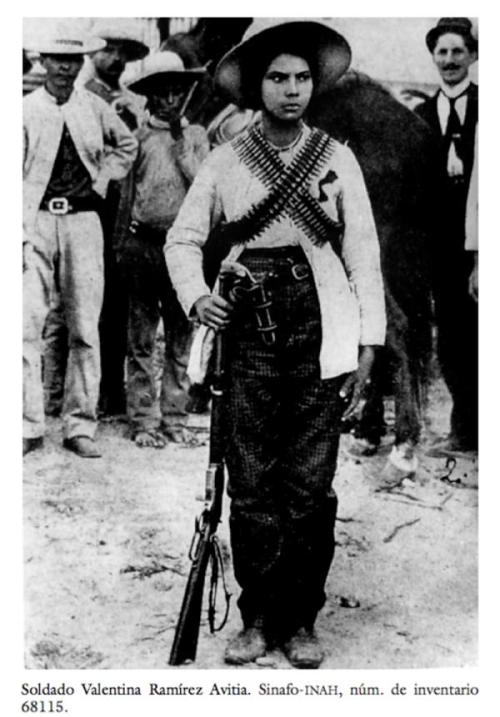
[1914 circa]
Letras y música / Testo e musica / Lyrics and music / Paroles et musique /Sanat ja sävel:
anonimo
Interpretado por / Interpreti / Performed by / Interprétée par / Laulavat:
1. Los Hermanos Záizar (Juan & David)
Album: La Adelita / La Valentina, 1967
2. Inti Illimani
Album: Hacia La Libertad , 1998
3.Jorge Negrete
Album: La Valentina, 1957
La canzone è dedicata a Valentina Ramírez, eroina della Rivoluzione Messicana. Il suo armamentario era una Carabina 30 30 , cartucciere sul petto e una rivoltella. Era solita nascondere le trecce con un nastro o sotto il cappello. Quando qualche “dorado”, indovinando che era una femmina, rivolto a lei la apostrofava “Ehi Chula !”, epiteto a metà tra graziosa e bella fica, lei rispondeva "Stai parlando con questa?,sai, si chiama chula” mentre accarezzava la rivoltella.
Valentina Ramírez Avitia (14 febbraio 1893 – 4 aprile... (continuer)
Letras y música / Testo e musica / Lyrics and music / Paroles et musique /Sanat ja sävel:
anonimo
Interpretado por / Interpreti / Performed by / Interprétée par / Laulavat:
1. Los Hermanos Záizar (Juan & David)
Album: La Adelita / La Valentina, 1967
2. Inti Illimani
Album: Hacia La Libertad , 1998
3.Jorge Negrete
Album: La Valentina, 1957
La canzone è dedicata a Valentina Ramírez, eroina della Rivoluzione Messicana. Il suo armamentario era una Carabina 30 30 , cartucciere sul petto e una rivoltella. Era solita nascondere le trecce con un nastro o sotto il cappello. Quando qualche “dorado”, indovinando che era una femmina, rivolto a lei la apostrofava “Ehi Chula !”, epiteto a metà tra graziosa e bella fica, lei rispondeva "Stai parlando con questa?,sai, si chiama chula” mentre accarezzava la rivoltella.
Valentina Ramírez Avitia (14 febbraio 1893 – 4 aprile... (continuer)
Una pasión me domina [1]
(continuer)
(continuer)
envoyé par Riccardo Gullotta 30/1/2025 - 16:42
Parcours:
Chansons d'amour contre la guerre
Il bastimento parte
anonyme
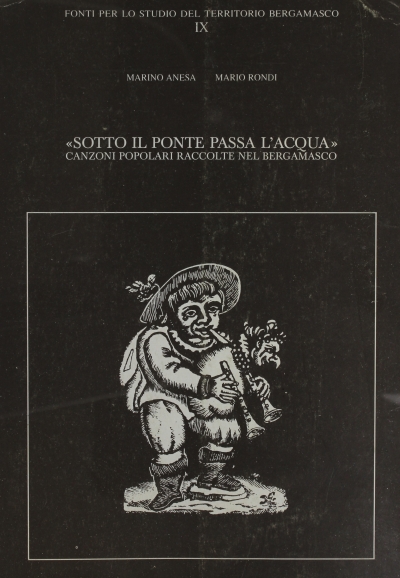
[XIX sec]
Testo e musica / Lyrics and music / Paroles et musique / Sanat ja sävel:
anonimo
Interpreti / Performed by / Interprétée par / Laulavat:
Sandra Boninelli (voce), Mimmo Boninelli
Oliviero Biella (chitarra)
Franco Ghigini (organo)
Sandro Massazza (contrabbasso)
Album: Il bastimento parte
La canzone fa parte di una raccolta pubblicata nel Fondo Tullio De Mauro a cura della Rete Italiana di Cultura Popolare. Il volume è titolato Sotto il ponte passa l’acqua, autori Marino Anesa e Mario Rondi. I canti raccolti nel bergamasco, definiti in chiave minimalista “filastrocche" popolari, furono registrati negli anni 1978-1971 in diciotto località delle valli Seriana, di Sclave e Calepio. La canzone proposta fu registrata a Gandino il 1° Aprile 1979.
Verso la cultura bergamasca chi scrive queste righe si sente in debito. Almeno 500 furono le camicie rosse bergamasche che presero parte alla spedizione dei Mille di Garibaldi, inquadrate nella VII Compagnia.
[Riccardo Gullotta]
Testo e musica / Lyrics and music / Paroles et musique / Sanat ja sävel:
anonimo
Interpreti / Performed by / Interprétée par / Laulavat:
Sandra Boninelli (voce), Mimmo Boninelli
Oliviero Biella (chitarra)
Franco Ghigini (organo)
Sandro Massazza (contrabbasso)
Album: Il bastimento parte
La canzone fa parte di una raccolta pubblicata nel Fondo Tullio De Mauro a cura della Rete Italiana di Cultura Popolare. Il volume è titolato Sotto il ponte passa l’acqua, autori Marino Anesa e Mario Rondi. I canti raccolti nel bergamasco, definiti in chiave minimalista “filastrocche" popolari, furono registrati negli anni 1978-1971 in diciotto località delle valli Seriana, di Sclave e Calepio. La canzone proposta fu registrata a Gandino il 1° Aprile 1979.
Verso la cultura bergamasca chi scrive queste righe si sente in debito. Almeno 500 furono le camicie rosse bergamasche che presero parte alla spedizione dei Mille di Garibaldi, inquadrate nella VII Compagnia.
[Riccardo Gullotta]
Il bastimento parte (continuer)
envoyé par Riccardo Gullotta 26/12/2024 - 15:26
Nat Turner / The Gainin' Ground / Virginia 1831
anonyme

With the tightening of all restrictions on them (the slaves) after the rebellion, any singing about Nat Turner had to be well disguised .A song about him has survived, in which there was humorous satire on the masters,who allowed it as kings once allowed jokes on themselves by court fools and jesters, mixed with a pun on Nat Turner’s name and veiled references to revolution and change.
- First discovered as "The Gainin’ Ground" in Pete Seeger Where Have All the Flowers Gone pg. 236
- later discovered it in John Greenway American Folksongs of Protest pg. 92-93
-and Russell Ames, The Story of American Folk Song, 1955, p.151-152. Ames contributes an additional verse in Story of American Folksong, p. 151. It appears with the heading “Virginia 1831” below the three main verses in the lyrics.
all three attribute discovery of the song to Lawrence Gellert
This is confirmed by Gellert, published... (continuer)
- First discovered as "The Gainin’ Ground" in Pete Seeger Where Have All the Flowers Gone pg. 236
- later discovered it in John Greenway American Folksongs of Protest pg. 92-93
-and Russell Ames, The Story of American Folk Song, 1955, p.151-152. Ames contributes an additional verse in Story of American Folksong, p. 151. It appears with the heading “Virginia 1831” below the three main verses in the lyrics.
all three attribute discovery of the song to Lawrence Gellert
This is confirmed by Gellert, published... (continuer)
You mought be rich as cream,
(continuer)
(continuer)
envoyé par Dq82 6/12/2024 - 18:09
Sulla sponda argentina
anonyme
dallo spettacolo teatrale "Milanin Milanon"
Dopo il delitto Matteotti viene realizzata una parodia popolare in dialetto milanese, con brevi frasi in lingua italiana sull'aria di Fox-trot della nostalgia di Cesare Andrea Bixio e Bruno Cherubini, scritta nel 1924.
La canzone, che porta la firma di autori che hanno prodotto molte canzoni di successo nel periodo tra le due guerre, racconta dell’agognato ritorno in patria degli emigrati in argentina. Il testo è condito di tutti gli stereotipi dell’emigrante con le mani protese verso l’agognata terra e nel cuore patria e mammà: rappresentazioni care alla retorica del regime fascista, che pur disinteressandosi dei suoi cittadini emigrati, consegna loro, assieme al passaporto rosso dell’espatrio per lavoro, il Manuale per l’istruzione degli emigranti, un volume di seicento pagine rivolto ad una popolazione in larga parte analfabeta, così autografato... (continuer)
Dopo il delitto Matteotti viene realizzata una parodia popolare in dialetto milanese, con brevi frasi in lingua italiana sull'aria di Fox-trot della nostalgia di Cesare Andrea Bixio e Bruno Cherubini, scritta nel 1924.
La canzone, che porta la firma di autori che hanno prodotto molte canzoni di successo nel periodo tra le due guerre, racconta dell’agognato ritorno in patria degli emigrati in argentina. Il testo è condito di tutti gli stereotipi dell’emigrante con le mani protese verso l’agognata terra e nel cuore patria e mammà: rappresentazioni care alla retorica del regime fascista, che pur disinteressandosi dei suoi cittadini emigrati, consegna loro, assieme al passaporto rosso dell’espatrio per lavoro, il Manuale per l’istruzione degli emigranti, un volume di seicento pagine rivolto ad una popolazione in larga parte analfabeta, così autografato... (continuer)
Sulla sponda argentina
(continuer)
(continuer)
envoyé par Dq82 30/11/2024 - 18:10
The Ballad of Naomi Wise [Omie Wise ; Naomi Wise; Ommie Wise; Poor Omie Wise]
anonyme
![The Ballad of Naomi Wise [Omie Wise ; Naomi Wise; Ommie Wise; Poor Omie Wise]](img/upl/wisetomb.webp)
[~ 1820]
Ballata tradizionale americana da foglio volante [North Carolina ?]
American traditional broadside ballad [North Carolina ?]
Ballade traditionnelle américaine [North Carolina ?]
Amerikkalainen perinteinen laajakantinen balladi
Prima registrazione / First recorded / 1er enregistrement:
Gilliam Banmon Grayson, 18.10.1927
Ho visto che, in questi ultimi giorni, la tematica del femminicidio e della violenza di genere è molto presente, e giustamente, su questo sito. Non che non lo sia stata anche prima; il percorso relativo contiene, purtroppo, ben 632 canzoni a tutt’oggi. Tema attuale, e antichissimo al tempo stesso; verrebbe da dire, antico quanto il mondo, antico quanto la guerra. E una guerra è, da sempre: quella dichiarata dagli uomini alle donne, talmente “l’altra metà del cielo” che in cielo i maschietti ce le hanno fatte volare fin dalla più remota antichità, e quasi sempre... (continuer)
Ballata tradizionale americana da foglio volante [North Carolina ?]
American traditional broadside ballad [North Carolina ?]
Ballade traditionnelle américaine [North Carolina ?]
Amerikkalainen perinteinen laajakantinen balladi
Prima registrazione / First recorded / 1er enregistrement:
Gilliam Banmon Grayson, 18.10.1927
Ho visto che, in questi ultimi giorni, la tematica del femminicidio e della violenza di genere è molto presente, e giustamente, su questo sito. Non che non lo sia stata anche prima; il percorso relativo contiene, purtroppo, ben 632 canzoni a tutt’oggi. Tema attuale, e antichissimo al tempo stesso; verrebbe da dire, antico quanto il mondo, antico quanto la guerra. E una guerra è, da sempre: quella dichiarata dagli uomini alle donne, talmente “l’altra metà del cielo” che in cielo i maschietti ce le hanno fatte volare fin dalla più remota antichità, e quasi sempre... (continuer)
Oh, listen to my story, I'll tell you no lies
(continuer)
(continuer)
envoyé par Riccardo Venturi 25/11/2024 - 17:58
We Don't Have No Payday Here
anonyme
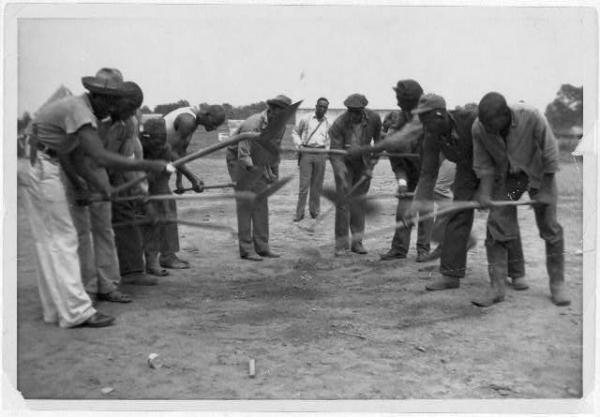
We Don't Have No Payday Here - ( Traditional )
Sung by a group of convicts at Raiford Penitentiary in Florida - June 4, 1939
Una traccia audio è reperibile nell'articolo :
Blues as Protest -Library of Congress
Sung by a group of convicts at Raiford Penitentiary in Florida - June 4, 1939
• Unidentified performers
• Lomax, John Avery, 1867-1948 (Collector)
• Lomax, John Avery, 1867-1948 (Collector)
Una traccia audio è reperibile nell'articolo :
Blues as Protest -Library of Congress
[ ....on this particular recording, there are some elements of "call-and-response" whereby someone responds to the lyrics with a spoken or exclaimed (not intoned/sung) comment---such as "water boy, water boy!" and "Lord have mercy!"]
Melanie Zeck
Melanie Zeck
We don’t have no pay, have no payday here
(continuer)
(continuer)
envoyé par Pluck 22/11/2024 - 11:20
בודאַפּעשט
anonyme

Bidapesht ; Budapesht
[XIX sec]
ליריקס און מוזיק / Testo e musica / Lyrics and music / Paroles et musique / Sanat ja sävel:
אַנאָנימע / Anonimo / Anonymous / Anonyme / Nimeämätön
יבערזעצן / Interprete / Performed by / Interprétée par / Laulavat :
Karsten Troyke
אלבאם / Album : Jidische Vergessene Lieder
Nella canzone di genere klezmer sono presenti elementi di musica rom. Anche Il videoclip è interessante per la sequenza delle pitture di Chagall , fanno pendant con l’ambiente descritto nella musica. Si apprezza l’interpretazione di Karsten Troyke, artista e cantante affermato nella esecuzione di opere della cultura ebraica.
Nei luoghi citati nella canzone sino alla seconda guerra mondiale c’erano delle fiorenti comunità ebraiche.
Più di 400mila ebrei ungheresi furono deportati dai nazisti nel 1944. Oggi gli ebrei residenti in Ungheria sono 100mila.
Anche la comunità Rom... (continuer)
[XIX sec]
ליריקס און מוזיק / Testo e musica / Lyrics and music / Paroles et musique / Sanat ja sävel:
אַנאָנימע / Anonimo / Anonymous / Anonyme / Nimeämätön
יבערזעצן / Interprete / Performed by / Interprétée par / Laulavat :
Karsten Troyke
אלבאם / Album : Jidische Vergessene Lieder
Nella canzone di genere klezmer sono presenti elementi di musica rom. Anche Il videoclip è interessante per la sequenza delle pitture di Chagall , fanno pendant con l’ambiente descritto nella musica. Si apprezza l’interpretazione di Karsten Troyke, artista e cantante affermato nella esecuzione di opere della cultura ebraica.
Nei luoghi citati nella canzone sino alla seconda guerra mondiale c’erano delle fiorenti comunità ebraiche.
Più di 400mila ebrei ungheresi furono deportati dai nazisti nel 1944. Oggi gli ebrei residenti in Ungheria sono 100mila.
Anche la comunità Rom... (continuer)
[2] ﬡיך בין אַ בחוﬧ יונג און פֿרײלעך איך פֿיﬥ זיך גוט [1]
(continuer)
(continuer)
envoyé par Riccardo Gullotta 27/10/2024 - 23:19
Il fornacione
anonyme

[> 1920 ca.]
Ripreso da Popolarcantare, un piccolo canzoniere autoprodotto consegnatomi a suo tempo dal cantastorie lucchese Gildo dei Fantardi. Recita la breve introduzione: “Questo stornello è stato raccolto da Dodi Moscati ad Arcidosso (Grosseto – Monte Amiata) intorno al 1970. Proviene da Santa Fiora, paese del Monte Amiata ricco di zolfo e che assorbiva in miniera gran parte della manodopera maschile. Alle santafioresi bastano una melodia e poche parole per esprimere il sentimento di un’esistenza tutta vissuta all’ombra della fatica più dura. Al ‘Fornacione’ ci stanno tre cancelli: e qui, all’ingresso della ‘miniera cane’ sta scritto il destino degli uomini di Santa Fiora. E’ stato riscontrato che anche in altre parti della Toscana si può trovare questo canto e anche in Lucchesia ne esiste una versione leggermente diversa da quella qui riproposta.”
Aggiungo qualche cosa. Dodi Moscati... (continuer)
Ripreso da Popolarcantare, un piccolo canzoniere autoprodotto consegnatomi a suo tempo dal cantastorie lucchese Gildo dei Fantardi. Recita la breve introduzione: “Questo stornello è stato raccolto da Dodi Moscati ad Arcidosso (Grosseto – Monte Amiata) intorno al 1970. Proviene da Santa Fiora, paese del Monte Amiata ricco di zolfo e che assorbiva in miniera gran parte della manodopera maschile. Alle santafioresi bastano una melodia e poche parole per esprimere il sentimento di un’esistenza tutta vissuta all’ombra della fatica più dura. Al ‘Fornacione’ ci stanno tre cancelli: e qui, all’ingresso della ‘miniera cane’ sta scritto il destino degli uomini di Santa Fiora. E’ stato riscontrato che anche in altre parti della Toscana si può trovare questo canto e anche in Lucchesia ne esiste una versione leggermente diversa da quella qui riproposta.”
Aggiungo qualche cosa. Dodi Moscati... (continuer)
Mamma non mi manda' al fornacione
(continuer)
(continuer)
envoyé par L'Anonimo Toscano del XXI Secolo 13/10/2024 - 18:26
The Dying Hobo
anonyme
A parody of Bingen on the Rhine.
From Folk-Songs of the South, Cox
Recorded by Doc Watson
DT #644
Laws H3
@hobo @train @death
filename[ DYINHOBO
RG
Mudcat Cafe' 1998 - 2024
From Folk-Songs of the South, Cox
Recorded by Doc Watson
DT #644
Laws H3
@hobo @train @death
filename[ DYINHOBO
RG
Mudcat Cafe' 1998 - 2024
Behind a Western water tank a dying hobo lay,
(continuer)
(continuer)
envoyé par Pluck 15/8/2024 - 19:32
Ortigara
anonyme
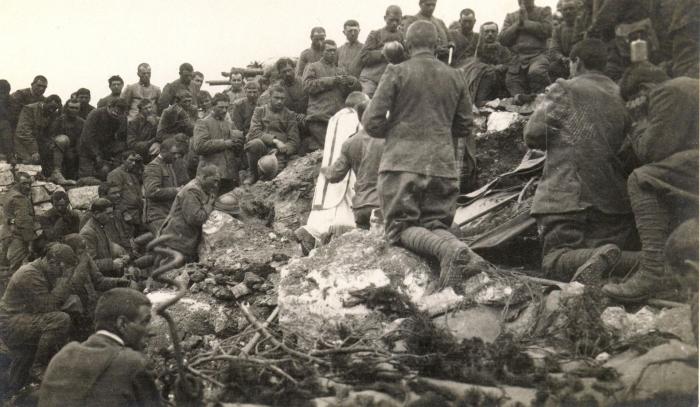
ORTIGARA ( Anonimo )
Canto degli Alpini - XX Sec.
Canto degli Alpini - XX Sec.
Per note sulla battaglia dell’Ortigara, combattuta dal 10 al 25 giugno 1917 tra l'esercito italiano e quello austriaco, per il possesso del Monte Ortigara, nell'altopiano di Asiago ( Vicenza ) , si consiglia la presentazione della canzone “ Mio nonno partì per l'Ortigara “ di Chiara Riondino su Canzoni Contro la Guerra.
O vecchio alpin
(continuer)
(continuer)
envoyé par Pluck 12/8/2024 - 07:30
Kâtibim
anonyme
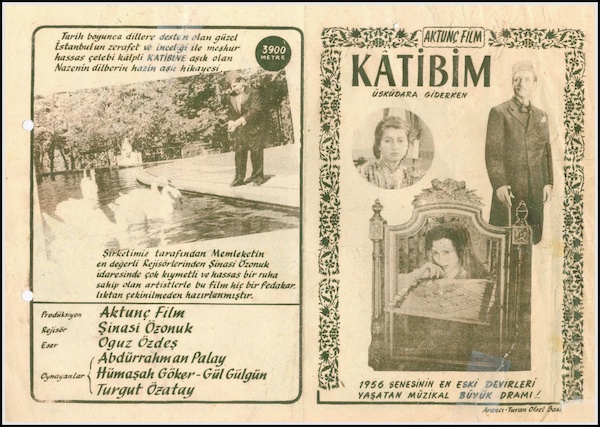
[XIX sec]
Söz ve müzik / Testo e musica / Lyrics and music / Paroles et musique / Sanat ja sävel
anonimo
Tarafından gerçekleştirilen / Testo e musica / Lyrics and music / Paroles et musique / Sanat ja sävel:
Ezgi Köker
Album: Türkülerimiz
Tarafından gerçekleştirilen / Interpreti / Performed by / Interprétée par / Laulavat:
Safiye Ayla
Album: Üsküdara Giderken (Kâtip)
Ezgi Köker
Album: Türkülerimiz
Naftule Brandwein
Der Terk in America, 1924
The Klezmer Conservatory Band (instrumental)
Album: Dance Me To The End Of Love
Se ci interpellassero per scegliere una canzone e un commento semplici come simbolo per mettere al bando le guerre e le sofferenze dei migranti sceglieremmo questa con il sottotitolo “Mediterranei di pace”. Questa melodia diffusa inizialmente in tutto l’impero ottomano si è poi affermata ovunque nel Mediterraneo. Sono numerose... (continuer)
Söz ve müzik / Testo e musica / Lyrics and music / Paroles et musique / Sanat ja sävel
anonimo
Tarafından gerçekleştirilen / Testo e musica / Lyrics and music / Paroles et musique / Sanat ja sävel:
Ezgi Köker
Album: Türkülerimiz
Tarafından gerçekleştirilen / Interpreti / Performed by / Interprétée par / Laulavat:
Safiye Ayla
Album: Üsküdara Giderken (Kâtip)
Ezgi Köker
Album: Türkülerimiz
Naftule Brandwein
Der Terk in America, 1924
The Klezmer Conservatory Band (instrumental)
Album: Dance Me To The End Of Love
Se ci interpellassero per scegliere una canzone e un commento semplici come simbolo per mettere al bando le guerre e le sofferenze dei migranti sceglieremmo questa con il sottotitolo “Mediterranei di pace”. Questa melodia diffusa inizialmente in tutto l’impero ottomano si è poi affermata ovunque nel Mediterraneo. Sono numerose... (continuer)
Üsküdar'a gider iken aldı da bir yağmur.
(continuer)
(continuer)
envoyé par Riccardo Gullotta 29/7/2024 - 23:38
Parcours:
Ponts
The Wayfaring Stranger [Libby Prison Hymn]
anonyme
![The Wayfaring Stranger [Libby Prison Hymn]](img/upl/lossy-page1-1250px-Virginia2C_Richmond2C_Libby_Prison_-_NARA_-_533362.tif.jpg)
[XIX sec.]
Lyrics and music /Testo e musica / Paroles et musique / Sanat ja sävel:
anonimo
Performed by / Interpreti / Interprétée par / Laulavat:
1. Joan Baez
Album : Poor Wayfaring Stranger
2. Paul Robeson
Album : The Power And The Glory
3. Pete Seeger
Album : Wayfaring Stranger
4. Johnny Cash
Album : American III: Solitary Man
5. Libby Prison Minstrels
6. Burl Ives
Album : The Wayfaring Stranger
7. Jos Slovick
OST: 1917
E’ una canzone folk e anche un gospel del XIX secolo. Fu pubblicata per la prima volta nel 1858 nella raccolta The Christian songster : a collection of hymns and spiritual songs, usually sung at camp, prayer, and social meetings, and revivals of religion ; designed for all denominations a cura di di Joseph Bever. Figura al n. 23 della raccolta, a pag. 34. Il testo si discosta in modo significativo dalle versioni diffuse in seguito. Anche il... (continuer)
Lyrics and music /Testo e musica / Paroles et musique / Sanat ja sävel:
anonimo
Performed by / Interpreti / Interprétée par / Laulavat:
1. Joan Baez
Album : Poor Wayfaring Stranger
2. Paul Robeson
Album : The Power And The Glory
3. Pete Seeger
Album : Wayfaring Stranger
4. Johnny Cash
Album : American III: Solitary Man
5. Libby Prison Minstrels
6. Burl Ives
Album : The Wayfaring Stranger
7. Jos Slovick
OST: 1917
E’ una canzone folk e anche un gospel del XIX secolo. Fu pubblicata per la prima volta nel 1858 nella raccolta The Christian songster : a collection of hymns and spiritual songs, usually sung at camp, prayer, and social meetings, and revivals of religion ; designed for all denominations a cura di di Joseph Bever. Figura al n. 23 della raccolta, a pag. 34. Il testo si discosta in modo significativo dalle versioni diffuse in seguito. Anche il... (continuer)
I am a poor wayfaring stranger
(continuer)
(continuer)
envoyé par Riccardo Gullotta 10/7/2024 - 11:32
Tots ara ilh prèian la luna
anonyme
E' questo uno dei pochissimi canti originali della tradizione occitana di Guardia Piemontese, i riferimenti contenuti nel testo sono al massacro dei Valdesi perpetrato dai soldati di papa Pio V nella cittadina in provincia di Cosenza, il 5 giugno 1561.
...durante i Medioevo la gente pregava: “Signore, proteggici dalla peste, dalla fame, dalla guerra”, il filosofo francese André Glucksmann sosteneva che la comunità esista non tanto per il bene, quanto contro il male ed Eugenio Montale scriveva: “Codesto solo oggi possiamo dirti, ciò che non siamo, ciò che non vogliamo”...(tratto da
Quando le Alpi piemontesi scesero in Calabria di Flavio Poltronieri, Terre Celtiche, 2023)
...durante i Medioevo la gente pregava: “Signore, proteggici dalla peste, dalla fame, dalla guerra”, il filosofo francese André Glucksmann sosteneva che la comunità esista non tanto per il bene, quanto contro il male ed Eugenio Montale scriveva: “Codesto solo oggi possiamo dirti, ciò che non siamo, ciò che non vogliamo”...(tratto da
Quando le Alpi piemontesi scesero in Calabria di Flavio Poltronieri, Terre Celtiche, 2023)
Tots ara ilh preian la luna
(continuer)
(continuer)
envoyé par Flavio Poltronieri 8/7/2024 - 23:13
African American Work Songs in a Texas Prison
anonyme
Buongiorno AWS.
In allegato vi invio la intera trascrizione del documentario : " African American Work Songs in a Texas Prison " di TOSHI, DANIEL, and PETER SEEGER del 1966, con i relativi testi delle canzoni registrate, ricevuta da : American Folklife Center .
Buon lavoro
Pluck
In allegato vi invio la intera trascrizione del documentario : " African American Work Songs in a Texas Prison " di TOSHI, DANIEL, and PETER SEEGER del 1966, con i relativi testi delle canzoni registrate, ricevuta da : American Folklife Center .
Buon lavoro
Pluck
African American Work Songs. Transcription. The numbered explanatory notes are entered as a group between the body of the film and its closing credits.
(Opening sequence, convicts led by Chinaman singing “Let your Hammer Ring” [1] while cross-cutting trees)
(continuer)
(continuer)
envoyé par Pluck 10/5/2024 - 17:13
Un vessillo
anonyme
Canzone che veniva cantata la mattina all'alza bandiera dai componenti della Divisione d'Assalto "Garibaldi-Natisone". Per testimonianza diretta del partigano Walter Zorzenone "Vipera" già componente della stessa Divisione, gli stessi partigiani la chiamavano scherzosamente "il caffè" in quanto era in qualche modo sostitutivo della bevanda logicamente non disponibile (Luciano Marcolini Provenza , segretario ANPI di Cividale del Friuli)
Un vessillo in alto sventola, (continuer)
envoyé par Dq82 29/4/2024 - 10:33
I Went to Atlanta
anonyme
American Folksongs of Protest by John Greenway
Philadelphia - University of Pennsylvania Press - 1953 - p.106
—Library of Congress, Archive of American Folk Song, unpublished collection.
Philadelphia - University of Pennsylvania Press - 1953 - p.106
—Library of Congress, Archive of American Folk Song, unpublished collection.
I went to Atlanta,
(continuer)
(continuer)
envoyé par Pluck 17/4/2024 - 23:33
I Am Sold and Going to Georgia
anonyme
Library of Congress, Archive of AmericanFolk Song, WPA Collection.
American Folksongs of Protest by John Greenway
Philadelphia University Pennsylvania Press 1953
p. 95-96
American Folksongs of Protest by John Greenway
Philadelphia University Pennsylvania Press 1953
p. 95-96
This song is usually sung by the chained gangs of slaves who are on their way, being driven from Maryland, Virginia, and Kentucky, to the more southern states for sale. The last line of each verse is the chorus, and gives a most impressive effect when sung—as it often is— by 60 or 150 voices echoing the plaintive grief of their hearts. This last line is intended as an appeal to all who have it in their power to aid in bringing about the jubilee of emancipation. -J. W. C. Pennington, D.D. Despite Dr. Pennington's contemporary affidavit that this is a Negro song, most observers will agree that its white origin is transparent; but it is worth including, if only for Dr. Pennington's intriguing phrase, "sung ... by 60 or 150 voices."
O! When shall we poor souls be free?
(continuer)
(continuer)
envoyé par Pluck 15/4/2024 - 17:21
I Want to Go Home
anonyme
Da : Slave Songs of the United States.
New York: A. Simpson & Co., 1867. - Part 1, p.46 , #61
William Francis Allen, (1830-1889), Charles Pickard Ware, (1840-1921), and Lucy McKim Garrison, ( 1842-1877) .
[Verse 7 was added after the Emancipation Proclamation.--J. S. R.]
da: William Francis Allen, (1830-1889), Charles Pickard Ware, (1840-1921), and Lucy McKim Garrison, ( 1842-1877) .
New York: A. Simpson & Co., 1867. - Part 1, p.46 , #61
William Francis Allen, (1830-1889), Charles Pickard Ware, (1840-1921), and Lucy McKim Garrison, ( 1842-1877) .
[Verse 7 was added after the Emancipation Proclamation.--J. S. R.]
da: William Francis Allen, (1830-1889), Charles Pickard Ware, (1840-1921), and Lucy McKim Garrison, ( 1842-1877) .
Dere's no rain to wet you.
(continuer)
(continuer)
envoyé par Pluck 11/4/2024 - 17:10
My Father, How Long ?
anonyme
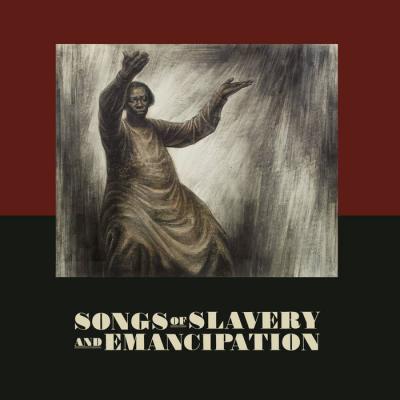
My Father, How Long ? ( Traditional )
Berea Songs of Slavery and Emancipation Ensemble
My Father, How Long? / We’ll Soon Be Free.
Two versions of the same song. First in TW Higginson* Army Life In A Black Regiment (pg. 169 XXXIV)
[For singing this “the negroes had been put in jail in Georgetown, S.C., at the outbreak of the Rebellion. ‘We’ll soon be free’ was too dangerous an assertion, and though the chant was an old one, it was no doubt sung with redoubled emphasis during the new events. ‘De Lord will call us home’ was evidently thought to be a symbolical verse; for, as a little drummer boy explained it to me, showing all his white teeth as he sat in the moonlight by the door of my tent, ‘Dey tink de Lord mean for say de Yankees.’”——T.W.H.]
second version, Slaves Songs of the United States, section IV., #112.
I made a composite lyric; music is based on that provided in Slave Songs... (continuer)
Berea Songs of Slavery and Emancipation Ensemble
My Father, How Long? / We’ll Soon Be Free.
Two versions of the same song. First in TW Higginson* Army Life In A Black Regiment (pg. 169 XXXIV)
[For singing this “the negroes had been put in jail in Georgetown, S.C., at the outbreak of the Rebellion. ‘We’ll soon be free’ was too dangerous an assertion, and though the chant was an old one, it was no doubt sung with redoubled emphasis during the new events. ‘De Lord will call us home’ was evidently thought to be a symbolical verse; for, as a little drummer boy explained it to me, showing all his white teeth as he sat in the moonlight by the door of my tent, ‘Dey tink de Lord mean for say de Yankees.’”——T.W.H.]
second version, Slaves Songs of the United States, section IV., #112.
I made a composite lyric; music is based on that provided in Slave Songs... (continuer)
My father, how long,
(continuer)
(continuer)
envoyé par Pluck 8/4/2024 - 21:31
I Gotta Run
anonyme
Album : Some Mississippi Sunday Morning
Parchman Prison Prayer - 2023
I GOTTA RUN as sung by L. Stevenson ( age 29 )
Per ulteriori notizie sull’album cui appartiene la traccia si rimanda all’articolo " Parchman Prison Prayer: quando le canzoni nascevano nelle prigioni". Allegato alla canzone “ Since I’ve Laid My Burden Down” ( Mississippi John Hurt ) di AWS.
Parchman Prison Prayer - 2023
I GOTTA RUN as sung by L. Stevenson ( age 29 )
Per ulteriori notizie sull’album cui appartiene la traccia si rimanda all’articolo " Parchman Prison Prayer: quando le canzoni nascevano nelle prigioni". Allegato alla canzone “ Since I’ve Laid My Burden Down” ( Mississippi John Hurt ) di AWS.
I gotta run, I gotta run, I gotta run.
(continuer)
(continuer)
envoyé par Pluck 3/4/2024 - 13:44
Let Your Hammer Ring
anonyme
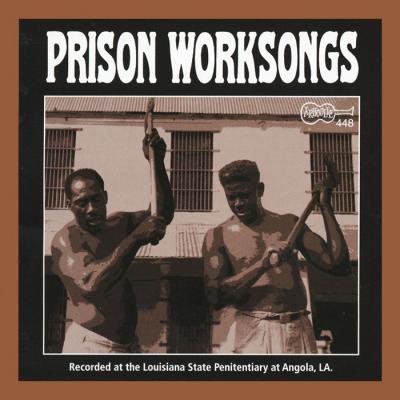
PRISON WORKSONGS
Recorded by Dr. Harry Oster at the Louisiana State Penitentiary at Angola, La. and other locations, mostly in 1959
Let Your Hammer Ring,
Big Louisiana, lead; Willy Rafus, and Arthur Davis.
Originally this song accompanied the driving of spikes into the wooden ties which held railroad tracks in place. The basic tool was a ten-pound hammer with two heads, hardly more than two inches in diameter. The steel-driving man swung freely in a complete circle about his head, then brought the hammer unerringly down on the spike. Since the railroad's disappearance at Angola, the same song has often been sung, as it is here, to facilitate wood-chopping. Unlike many of the group worksongs, "Let Your Hammer Ring" has artistic unity. The subject in this magnificent song swings naturally from the ring of the hammer to ringing a plea to the governor for pardon; the desire for a pardon... (continuer)
Recorded by Dr. Harry Oster at the Louisiana State Penitentiary at Angola, La. and other locations, mostly in 1959
Let Your Hammer Ring,
Big Louisiana, lead; Willy Rafus, and Arthur Davis.
Originally this song accompanied the driving of spikes into the wooden ties which held railroad tracks in place. The basic tool was a ten-pound hammer with two heads, hardly more than two inches in diameter. The steel-driving man swung freely in a complete circle about his head, then brought the hammer unerringly down on the spike. Since the railroad's disappearance at Angola, the same song has often been sung, as it is here, to facilitate wood-chopping. Unlike many of the group worksongs, "Let Your Hammer Ring" has artistic unity. The subject in this magnificent song swings naturally from the ring of the hammer to ringing a plea to the governor for pardon; the desire for a pardon... (continuer)
Ring 'em all together,
(continuer)
(continuer)
envoyé par Pluck 19/3/2024 - 18:55
Early in the Mornin'
anonyme
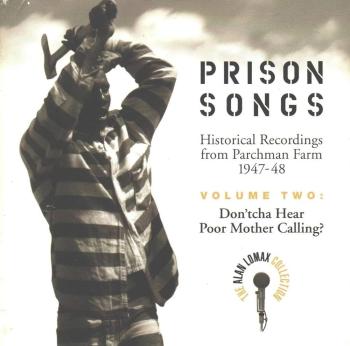
Prison Worksongs.
Recorded by Dr. Harry Oster at the Louisiana State Penitentiary , Angola, La. and other locations, mostly in 1959.
Early in the Mornin', Johnny Butler and gang.
This cane cutting song, usually known as the "Bullin' Hundred," is the best known surviving group worksong at Angola. A gang of approximately a hundred prisoners (they refer to themselves ironically as bulls since they are frustrated and womanless) joins the moaning chorus of the song; often different workers lead the singing, sometimes describing their own personal history in verses they make up, or more often drawing on a fund of traditional verses.
Recorded by Dr. Harry Oster at the Louisiana State Penitentiary , Angola, La. and other locations, mostly in 1959.
Early in the Mornin', Johnny Butler and gang.
This cane cutting song, usually known as the "Bullin' Hundred," is the best known surviving group worksong at Angola. A gang of approximately a hundred prisoners (they refer to themselves ironically as bulls since they are frustrated and womanless) joins the moaning chorus of the song; often different workers lead the singing, sometimes describing their own personal history in verses they make up, or more often drawing on a fund of traditional verses.
Gang: Let's hook 'em, let's hook 'em now. Woah.
(continuer)
(continuer)
envoyé par Pluck 13/3/2024 - 21:12
Sanningens Landsflykt
anonyme
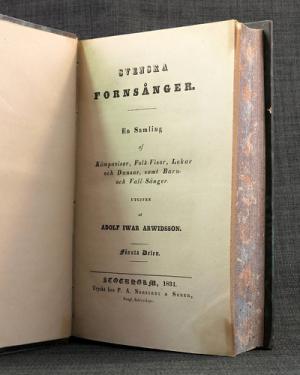
[XVI o XVII Secolo / 16th or 17th Century]
Svensk Fornsång / Antico canto svedese / Old Swedish Song / Ancienne chanson suédoise / Ruotsalainen vanha laulu
Si parla in questi giorni delle vie dei canti, cioè dei mondi in cui canti, canzoni, musiche e, non di rado, anche poesie arrivano al nostro sito. Bene, ciò che sto per introdurvi è uno dei casi più tipici, vale a dire il puro purissimo caso innescato dalla curiosità e dalla ricerca in Rete, nonché da un’altra canzone. Proprio oggi, dopo aver inserito una canzone di Mikael Wiehe che parla di verità e menzogna, mi è saltato l’ùzzolo di cercare altre canzoni sul tema. Qui, naturalmente, interviene un po’ la mia “particolarità”, chiamiamola così; con in testa ancora la lingua svedese, che pratico da oltre quarant’anni, non è che mi sia messo a cercare, che so io, “canzoni su verità e giustizia” o “songs on truth and lie”. No, su Google... (continuer)
Svensk Fornsång / Antico canto svedese / Old Swedish Song / Ancienne chanson suédoise / Ruotsalainen vanha laulu
Si parla in questi giorni delle vie dei canti, cioè dei mondi in cui canti, canzoni, musiche e, non di rado, anche poesie arrivano al nostro sito. Bene, ciò che sto per introdurvi è uno dei casi più tipici, vale a dire il puro purissimo caso innescato dalla curiosità e dalla ricerca in Rete, nonché da un’altra canzone. Proprio oggi, dopo aver inserito una canzone di Mikael Wiehe che parla di verità e menzogna, mi è saltato l’ùzzolo di cercare altre canzoni sul tema. Qui, naturalmente, interviene un po’ la mia “particolarità”, chiamiamola così; con in testa ancora la lingua svedese, che pratico da oltre quarant’anni, non è che mi sia messo a cercare, che so io, “canzoni su verità e giustizia” o “songs on truth and lie”. No, su Google... (continuer)
I fordom tid var sanningen mägtig och båld,
(continuer)
(continuer)
envoyé par Riccardo Venturi 13/3/2024 - 03:03
Fort Smith Jail
anonyme
Missouri State - Max Hunter Folk Song Collection
Fort Smith Jail
Cat. #1388 (MFH #254) - As sung by Joan O'Bryant, Wichita, Kansas
Fort Smith Jail
Cat. #1388 (MFH #254) - As sung by Joan O'Bryant, Wichita, Kansas
Come all you people, I'll tell you a tale
(continuer)
(continuer)
envoyé par Pluck 10/3/2024 - 21:07
Parcours:
Des prisons du monde
Lonely Banna Strand (the Ballad of Roger Casement)
anonyme
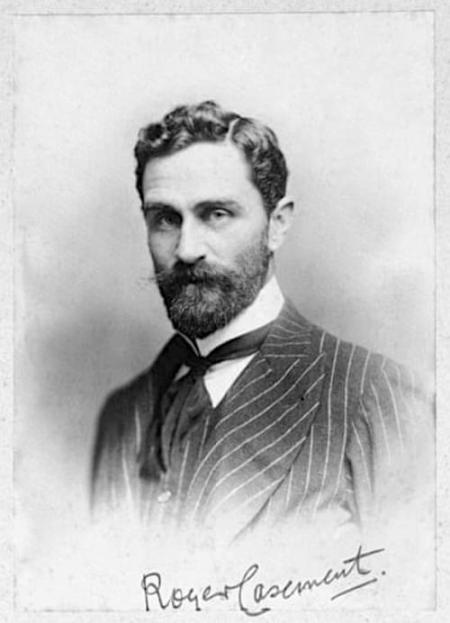
"Roger David Casement (1864 – 1916) was a humanitarian campaigner and an Irish patriot, poet, revolutionary, and nationalist. He was a British consul, famous for his reports and activities against human rights abuses in the Congo and Peru and also for his dealings with Germany before Ireland’s Easter Rising in 1916. An Irish nationalist and Parnellite in his youth, he worked in Africa for commercial interests and later in the service of Britain. However, the Boer War and his consular investigation into atrocities in the Congo led Casement to anti-Imperialist and, ultimately, to Irish Republican and separatist political opinions. He sought to obtain German support for a rebellion in Ireland against British rule. Shortly before the Easter Rising, he landed in Ireland and was arrested. He was subsequently convicted and executed by the British for treason. His remains were buried in the yard... (continuer)
It was on Good Friday morning, all in the month of May.
(continuer)
(continuer)
envoyé par Dq82 9/3/2024 - 10:22
Parcours:
Les conflits irlandais
Hard Times in Jail
anonyme
Missouri State - Max Hunter Folk Song Collection
Hard Times in Jail
Cat. #0475 (MFH #254) - As sung by Mr. Alford, Delmar, Arkansas on February 2, 1960
Hard Times in Jail
Cat. #0475 (MFH #254) - As sung by Mr. Alford, Delmar, Arkansas on February 2, 1960
Jest th other day I heard th jailer say
(continuer)
(continuer)
envoyé par Pluck 7/3/2024 - 21:20
La Serva 'd Ciamboun
anonyme
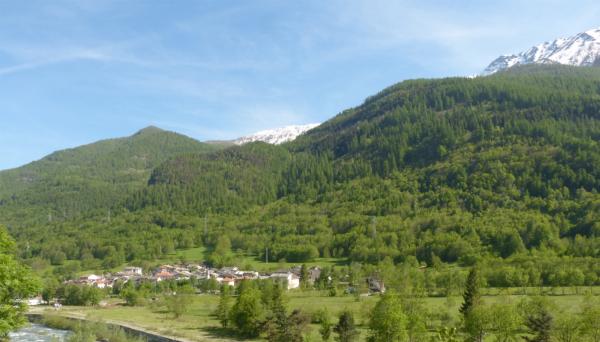
[1898]
Versi di anonimo autore popolare che celebrano la resistenza degli abitanti - e delle donne, in particolare - di Chambons, oggi frazione del Comune di Fenestrelle, in Val Chisone, provincia di Torino, al taglio della loro "Serva", il grande bosco di antichissimi larici, ancora oggi per fortuna esistente, grazie a loro.
Testo originale e traduzione italiana reperiti sul n. 5, inverno 2006/2007, della rivista trimestrale "Nunatak. Rivista di storie, culture, lotte della montagna"
La faccio breve e rimando a seguire alle fonti più autorevoli:
"Di là, protette dalla nebbia fittissima, che le rendeva invisibili, si diedero a far rotolare numerosi e grossi macigni giù per la china.
Le autorità mandarono allora un consigliere della borgata a parlamentare, ma le donne lo accolsero a sassate ed egli dovette retrocedere.
Intanto gli operai, visto il pericolo, se la diedero a gambe e non... (continuer)
Versi di anonimo autore popolare che celebrano la resistenza degli abitanti - e delle donne, in particolare - di Chambons, oggi frazione del Comune di Fenestrelle, in Val Chisone, provincia di Torino, al taglio della loro "Serva", il grande bosco di antichissimi larici, ancora oggi per fortuna esistente, grazie a loro.
Testo originale e traduzione italiana reperiti sul n. 5, inverno 2006/2007, della rivista trimestrale "Nunatak. Rivista di storie, culture, lotte della montagna"
La faccio breve e rimando a seguire alle fonti più autorevoli:
"Di là, protette dalla nebbia fittissima, che le rendeva invisibili, si diedero a far rotolare numerosi e grossi macigni giù per la china.
Le autorità mandarono allora un consigliere della borgata a parlamentare, ma le donne lo accolsero a sassate ed egli dovette retrocedere.
Intanto gli operai, visto il pericolo, se la diedero a gambe e non... (continuer)
A i era a Mentoule
(continuer)
(continuer)
7/3/2024 - 13:29
Parcours:
Guerre à la Terre
Angola Bound
anonyme
ANGOLA BOUND - Traditional prison song
Testo trascritto da Azizi Powell
Angola Prison, officially known as the Louisiana State Penitentiary, is one of the largest maximum security prisons in the country. In the 1950s, LSU English professor Dr. Harry Oster recorded a series of music performances by African American prisoners at the infamous facility. The performances, many by prisoners serving life sentences, are full of despair and raw emotion.
Testo trascritto da Azizi Powell
Angola Prison, officially known as the Louisiana State Penitentiary, is one of the largest maximum security prisons in the country. In the 1950s, LSU English professor Dr. Harry Oster recorded a series of music performances by African American prisoners at the infamous facility. The performances, many by prisoners serving life sentences, are full of despair and raw emotion.
Oh so many mornings I got to wake up soon
(continuer)
(continuer)
envoyé par Pluck 28/2/2024 - 22:45
Parcours:
Des prisons du monde
Old Alabama
anonyme
Old Alabama / Dan "B.B." Barnes and Group (Axe Song)
Da / From : Alan Lomax – Negro Prison Blues And Songs - 1947
Recorded live at the Mississippi and Louisiana State Penitentiaries
by Alan Lomax
Da / From : Alan Lomax – Negro Prison Blues And Songs - 1947
Recorded live at the Mississippi and Louisiana State Penitentiaries
by Alan Lomax
Old Alabama joins the state of Florida
(continuer)
(continuer)
envoyé par Pluck 27/2/2024 - 13:26
How Long, Brethren ?
anonyme
Lawrence Gellert - Negro Songs of Protest.
Published by the American Music League - New York - 1936
Published by the American Music League - New York - 1936
How long, brethren, how long,
(continuer)
(continuer)
envoyé par Pluck 27/2/2024 - 09:27
Sistren an’ Brethren
anonyme
Lawrence Gellert -"Negro Songs of Protest"
Published by the American Music League - New York 1936
Published by the American Music League - New York 1936
Stop foolin’ wid pray
(continuer)
(continuer)
envoyé par Pluck 27/2/2024 - 00:17
'Cause I'm a Nigger
anonyme
da
Lawrence Gellert, “Negro Songs of Protest”
Published by the American Music League - New York - 1936
Lawrence Gellert, “Negro Songs of Protest”
Published by the American Music League - New York - 1936
You take mah labor
(continuer)
(continuer)
envoyé par Pluck 26/2/2024 - 17:15
Work Ox
anonyme
da:
Me and My Captain: Chain Gang Negro Songs of Protest
by Lawrence Gellert, 1939
Me and My Captain: Chain Gang Negro Songs of Protest
by Lawrence Gellert, 1939
I ain’t gonna be your old work ox no more,
(continuer)
(continuer)
envoyé par Pluck 25/2/2024 - 15:28
Work All the Summer
anonyme
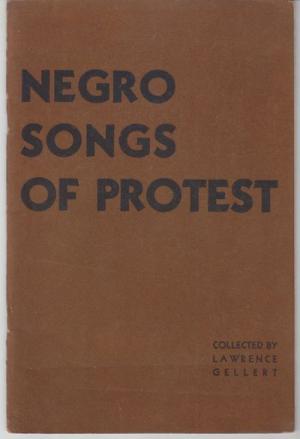
da :
Negro Songs Of Protest
Collected by Lawrence Gellert
American Music League – New York - 1932
Interpretata da:
- Paul Robeson
Negro Songs Of Protest
Collected by Lawrence Gellert
American Music League – New York - 1932
Interpretata da:
- Paul Robeson
Work All The Summer
(continuer)
(continuer)
envoyé par Pluck 25/2/2024 - 11:00
Parcours:
Des prisons du monde
Hív az antifasiszta akció
anonyme

Scritta tra il 1920 e il 1939 e incisa nel 1967 nel disco "Fáklyavivők 5 - Dalok, Hősök, Emlékek 1920-1939" pubblicato dalla etichetta di stato ungherese
Si tratta di una canzone antifascista che avverte i proletari: il fascismo è vicino, se vince ci aspetta un'altra guerra.
Si tratta di una canzone antifascista che avverte i proletari: il fascismo è vicino, se vince ci aspetta un'altra guerra.
Nyár van, dolgozunk, görnyedünk földeken,
(continuer)
(continuer)
21/1/2024 - 20:22
Parcours:
CCG Antifà: Antifascisme militant
At the Welcome Table
anonyme
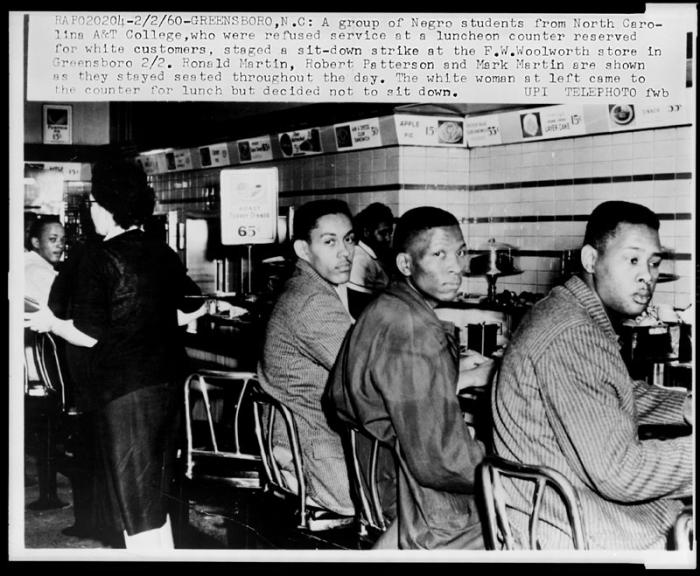
I'M GONNA SIT AT THE WELCOME TABLE
(civil rights version)
Testo e note da : I'm Gonna Sit At The Welcome Table (civil rights song)
This song is an adaptation of the African American Spiritual/Gospel with the same title.
(civil rights version)
Testo e note da : I'm Gonna Sit At The Welcome Table (civil rights song)
This song is an adaptation of the African American Spiritual/Gospel with the same title.
I'm gonna sit at the welcome table,*
(continuer)
(continuer)
envoyé par Pluck 6/1/2024 - 13:00
Eres alta y delgada
anonyme

Letras y música / Testo e musica / Lyrics and music / Paroles et musique / Sanat ja sävel:
anonimo
Intérpretes / Interpreti / Performed by / Interprétée par / Laulavat:
Rolando Alarcón
Album: Canciones De La Guerra Civil Española
Il brano é una canzone tradizionale di origini cantabriche. Fa parte del repertorio della Guerra Civile spagnola.
anonimo
Intérpretes / Interpreti / Performed by / Interprétée par / Laulavat:
Rolando Alarcón
Album: Canciones De La Guerra Civil Española
Il brano é una canzone tradizionale di origini cantabriche. Fa parte del repertorio della Guerra Civile spagnola.
Eres alta y delgada como tu madre, (continuer)
envoyé par Riccardo Gullotta 20/12/2023 - 23:15
Encore un petit verre de vin
anonyme
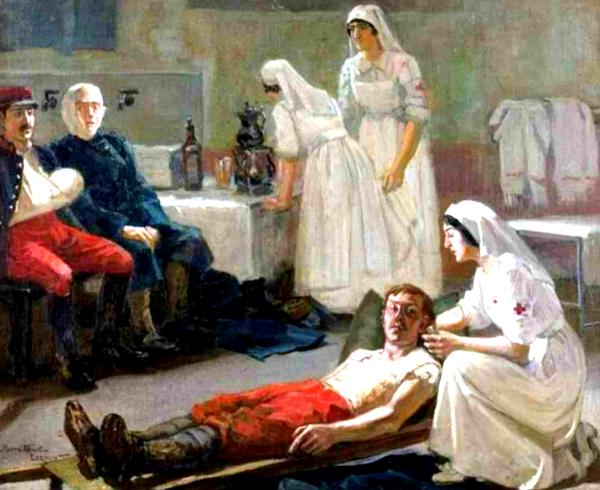
Encore un petit Verre de Vin
Chanson française - Encore un petit Verre de Vin – anonyme – circa 1914 – 1915
Dialogue Maïeutique
Voici, Lucien l’âne mon ami, une chanson française populaire, réputée « chanson à boire » - et elle l’est ; mais je suis absolument sûr qu’elle a eu un tout autre sens du côté de Verdun et autres lieux du genre entre 1914 et 1918.
Ah, oui !, s’étonne Lucien l’âne, et comment tu sais ça et comment tu peux en être si sûr.
Tout simplement à cause de ma grand-mère, réplique Marco Valdo M.I., qui la chantait souvent quand j’étais enfant. J’ai encore dans l’oreille ce refrain qu’elle fredonnait comme ça :
« Encore un petit verre de vin,
Pour nous mettre en rou-ou-ou-ou - te ;
Encore un petit verre de vin,
Pour nous mettre en train. »
Oui, dit Lucien l’âne, d’une voix ironique et nettement sceptique, mais encore ?
Oh, Lucien l’âne mon ami, quand elle me chantait... (continuer)
Chanson française - Encore un petit Verre de Vin – anonyme – circa 1914 – 1915
Dialogue Maïeutique
Voici, Lucien l’âne mon ami, une chanson française populaire, réputée « chanson à boire » - et elle l’est ; mais je suis absolument sûr qu’elle a eu un tout autre sens du côté de Verdun et autres lieux du genre entre 1914 et 1918.
Ah, oui !, s’étonne Lucien l’âne, et comment tu sais ça et comment tu peux en être si sûr.
Tout simplement à cause de ma grand-mère, réplique Marco Valdo M.I., qui la chantait souvent quand j’étais enfant. J’ai encore dans l’oreille ce refrain qu’elle fredonnait comme ça :
« Encore un petit verre de vin,
Pour nous mettre en rou-ou-ou-ou - te ;
Encore un petit verre de vin,
Pour nous mettre en train. »
Oui, dit Lucien l’âne, d’une voix ironique et nettement sceptique, mais encore ?
Oh, Lucien l’âne mon ami, quand elle me chantait... (continuer)
Encore un petit verre de vin,
(continuer)
(continuer)
envoyé par Marco Valdo M.I. 16/12/2023 - 18:20
Parcours:
La Grande Guerre (1914-1918)
Song of the Coffle Gang
anonyme
Trascrizione di Azizi Powell del testo cantato da Mike Seeger ( 1933 – 2009 ) “Stolen Soul from Africa “ , titolo alternativo di “Song of the Coffle Gang” , pubblicato da Library of Congress nel 2007 vedi :
Library of Congress
Library of Congress
We are stolen souls from Africa
(continuer)
(continuer)
envoyé par Pluck 27/11/2023 - 22:16
Lassù in cima al Monte Nero (Caramba)
anonyme

l abbiamo cantata in un giorno di novembre che c erano in cielo le gru che passavano per andare a sud
Marcello e Renzo 22/11/2023 - 15:30
Song of the Coffle Gang
anonyme
Notes.
Said to be written by a Slave.
This song is said to be sung by Slaves, as they are chained in gangs,
when parting from friends for the far off South—children taken from
parents, husbands from wives, and brothers from sisters.
Lyrics | Shackles, Chains and Forgotten Souls
WordPress.com
https://shacklesandchains.wordpress.com › ...
Said to be written by a Slave.
This song is said to be sung by Slaves, as they are chained in gangs,
when parting from friends for the far off South—children taken from
parents, husbands from wives, and brothers from sisters.
Lyrics | Shackles, Chains and Forgotten Souls
WordPress.com
https://shacklesandchains.wordpress.com › ...
Pluck 19/11/2023 - 18:58
Come Join the Abolitionists
anonyme
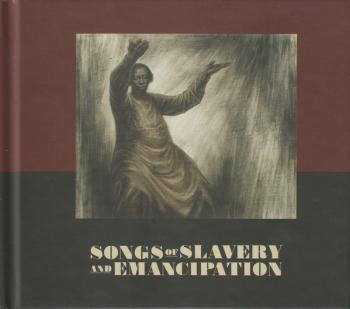
The Anti-Slavery Harp
Compiled by William W. Brown
Boston: Bela Marsh, 1848 pag. 40,41
COME JOIN THE ABOLITIONISTS ( Traditional )
AIR — When I can read my title clear
Compiled by William W. Brown
Boston: Bela Marsh, 1848 pag. 40,41
COME JOIN THE ABOLITIONISTS ( Traditional )
AIR — When I can read my title clear
Come join the Abolitionists,
(continuer)
(continuer)
envoyé par Pluck 14/11/2023 - 13:27
What Mean Ye?
anonyme
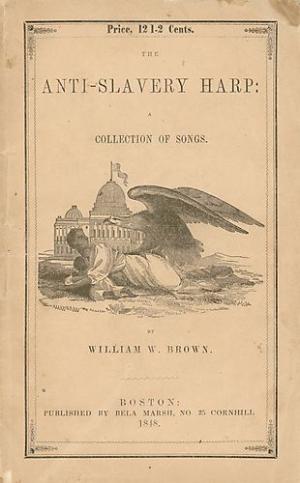
The Anti-Slavery Harp
Compiled by William W. Brown
Boston: Bela Marsh, 1848 p. 46
AIR — Ortonville
Compiled by William W. Brown
Boston: Bela Marsh, 1848 p. 46
AIR — Ortonville
What mean ye that ye bruise and bind
(continuer)
(continuer)
envoyé par Pluck 13/11/2023 - 08:19
Ye Heralds of Freedom
anonyme

The Anti-Slavery Harp
Compiled by William W. Brown
Boston: Bela Marsh, 1848 pag. 31,32
Compiled by William W. Brown
Boston: Bela Marsh, 1848 pag. 31,32
Ye heralds of freedom, ye noble and brave,
(continuer)
(continuer)
envoyé par Pluck 12/11/2023 - 08:40
O Gorizia, tu sei maledetta
anonyme
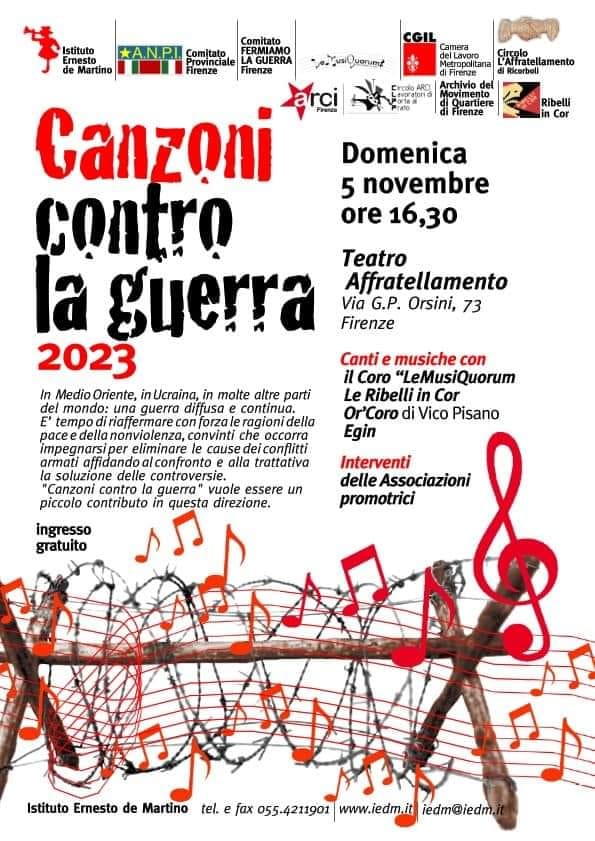
Anche quest'anno torna a Firenze il tradizionale concerto di Canzoni contro la guerra all'Affratellamento. Ci vediamo domenica!
CCG Staff 31/10/2023 - 17:49
La mala nova
anonyme

MANO TESA AL ROJAVA DAI PAISOS CATALANS
Gianni Sartori
Dai Paisos Catalans solidarietà all’Amministrazione Autonoma del Rojava e apprezzamenti per l’esperienza del Confederalismo Democratico. Due esponeti di YPJ e SDF intervengono al Parlamento catalano.
Risaliva a oltre due anni fa la prima richiesta di alcuni gruppi politici catalani al Parlament de Catalunya di riconoscere ufficialmente l’Amministrazione autonoma in Rojava.
Tra i promotori: l’ERC (Esquerra Republicana de Catalunya), la CUP (Candidatura d’Unitat Popular), l’ECP (En Comú Podem) e Junts. Per l’ERC aveva firmato il deputato Ruben Wagensberg.
A tale scopo il 19 luglio 2021 era stata depositata una proposta di risoluzione poi sottoposta al dibattito parlamentare. Si chiedeva inoltre di costruire una rete solidale tra la Catalunya e la Siria del Nord e dell’Est. Non solamente con interventi di cooperazione materiale,... (continuer)
Gianni Sartori
Dai Paisos Catalans solidarietà all’Amministrazione Autonoma del Rojava e apprezzamenti per l’esperienza del Confederalismo Democratico. Due esponeti di YPJ e SDF intervengono al Parlamento catalano.
Risaliva a oltre due anni fa la prima richiesta di alcuni gruppi politici catalani al Parlament de Catalunya di riconoscere ufficialmente l’Amministrazione autonoma in Rojava.
Tra i promotori: l’ERC (Esquerra Republicana de Catalunya), la CUP (Candidatura d’Unitat Popular), l’ECP (En Comú Podem) e Junts. Per l’ERC aveva firmato il deputato Ruben Wagensberg.
A tale scopo il 19 luglio 2021 era stata depositata una proposta di risoluzione poi sottoposta al dibattito parlamentare. Si chiedeva inoltre di costruire una rete solidale tra la Catalunya e la Siria del Nord e dell’Est. Non solamente con interventi di cooperazione materiale,... (continuer)
Gianni Sartori 19/10/2023 - 10:21
×
![]()

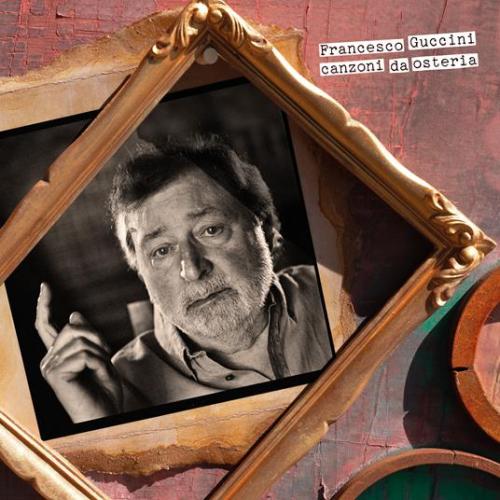
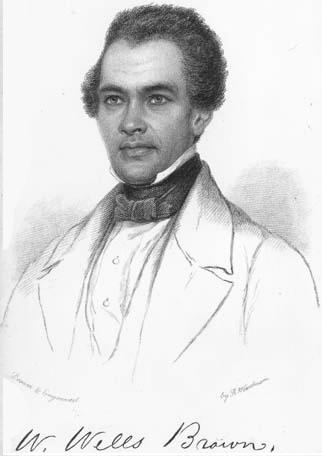
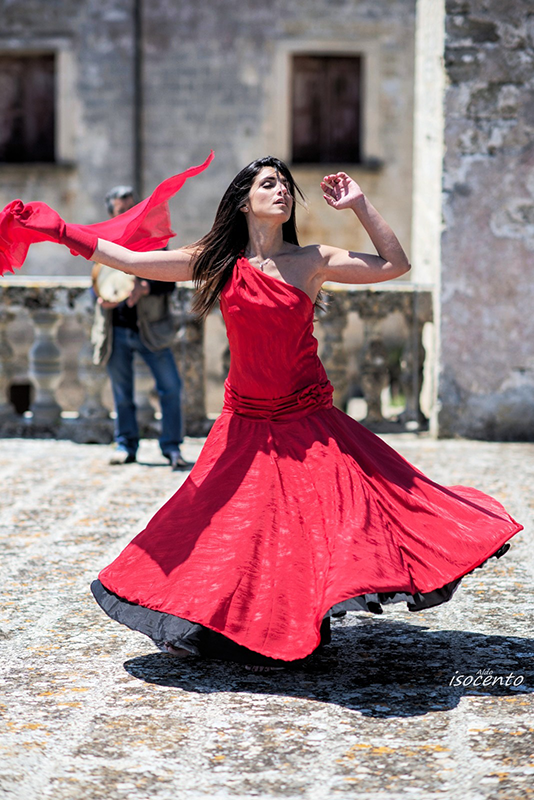

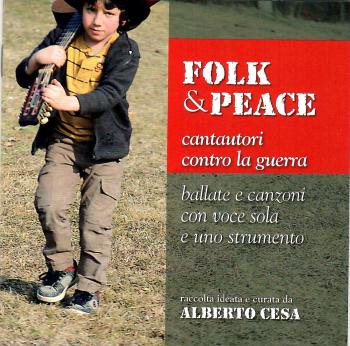



anonimo
Musica / Music / Musique / Sävel:
Arrangement : Etta Scollo
Ntirpriti / Interpreti / Performed by / Interprétée par / Laulavat :
Etta Scollo (Voce) , Daniel Moheit ( Fisarmonica), Fabio Tricomi (viella, flauto)
Album: Il viaggio di Maria
La catanese Etta Scollo è un’artista di elevata sensibilità. I suoi progetti musicali intersecano la terra d’origine, il Mediterraneo, la cultura araba medioevale e la Mitteleuropa. La sua è una reinterpretazione che tocca le corde, genera pensieri e vita.
Il testo del canto è stato elaborato nei secoli scorsi, i fatti risalgono, com’è noto, a un paio di millenni. E tuttavia la narrazione riesce ad attraversare il quotidiano, è intrisa di attualità. Accanto alle fonti considerate ufficiali, “canoniche”, dalla Chiesa, esiste una vasta letteratura che è stata prima depotenziata, poi sepolta dalla... (continuer)